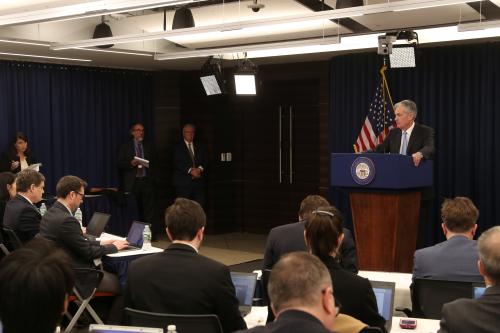

11:30 am EDT - 12:45 pm EDT
Past Event
In 2017, the G-20 launched its G-20 Partnership with Africa. It comprises several initiatives, the ‘Compact with Africa’ being its core element. The Compact with Africa (CWA) sets up a structured partnership between volunteering African countries and the G-20 with the inclusion of key multilateral and bilateral partners and, importantly, the private sector. The CWA aims to serve as an enabling platform to boost private investment and close the large investment gap, notably in infrastructure. Seven African countries have already joined the initiative—Côte d’Ivoire, Ghana, Ethiopia, Morocco, Rwanda, Senegal, and Tunisia. Although the CWA is anchored in the African Union’s 2063 Agenda and each country’s aspirations under the 2030 Development Agenda, it does not spell out how the CWA and private investment contribute to these agendas.
In order to explore these and other new approaches to international cooperation by the G-20, on Wednesday, October 11, the Brookings Institution collaborated with the Argentinian Council for International Relations (CARI), the German Development Institute (DIE), the Kiel Institute for the World Economy, and the Center for the Implementation of Public Policies Promoting Equity and Growth (CIPPEC) to host the Think 20 conference. Under the theme “After the G-20 Summit in Hamburg: Ways forward to revive international cooperation,” the conference presented panels on topics such as the transition from the German to the Argentinian G-20 presidency and the relationship between the G-20 and the 2030 Agenda. The panel, “G-20 Compact with Africa: Supporting the SDGs and Agenda 2063,” was a key part of the event.
The compact comes at an opportune time; aggregate real GDP growth for the continent has declined and government debt levels are on the rise. Meanwhile, financing needs for the continent are growing and public resources are not sufficient to meet the funding gap, hence the need to mobilize more private capital.
The discussants began the session by delving into more traditional Western policies toward Africa. One panelist highlighted that 30 years of policy conditionality have failed to create the desired results and attract private capital in African countries. When attracting private investment, since the prime actor is the African government, it is important to let its voice be the loudest. Consequently, the compact presents a new and different direction in terms of partnerships for financing African development. One speaker emphasized that the compact deviates from the paternalistic attitude toward Africa that has traditionally existed: It was not created to dictate instructions to African countries and threaten them with sanctions when they fail to follow said instructions.
The compact was created under the overarching objectives of financing infrastructure and private investment. While it is beneficial to have a country’s objectives align with the overarching objectives, it is not a requirement by any means. Many governments have designed financing plans and the compact can serve as a complement to said strategies. Consequently, the compact has created a menu of opportunities in the aim to allow countries to customize the best option for their economies.
The compact is designed to encourage peer learning. Presently a list of countries—Côte d’Ivoire, Ethiopia, Ghana, Morocco, Rwanda, Senegal and Tunisia, among others—are in the process of setting up compacts. Once installed, they will provide opportunities for other African countries to learn from their peers. Nevertheless, the scope for peer learning is limited given the specific circumstance, which surround different African countries. One discussant recommended that the design of country-specific compacts be focused and take into account the context of said country. Moreover, the current compacts are with stable well-governed African countries, thus leaving out fragile states. When addressing the question of inclusivity, another panelist mentioned the importance of the Compact with Africa for the wider development of the region. While private investment is important, one must not ignore the importance of aid in meeting fragile states’ dire needs.
Globally, there is a large pool of savings, which is having trouble finding a home, according to one speaker. The compact aims to bridge the capital mismatch. The compact with Africa initiative comes at a timely moment; as stated earlier, lower growth and higher debt levels have put a strain on public resources. Today, the African continent is in dire need of finance for development, the panelists agreed. Accessing financing at a reasonable cost is a challenge and addressing the infrastructure gap is a priority, emphasized one discussant. Furthermore, there is a need to boost capabilities on the continent and enhance domestic resource mobilization.
Creating solid capital markets for African countries is a key priority and more investment is needed on the ground stressed the panel. Specifically, technical assistance must be more effective. The factors that limit the effectiveness of technical assistance must be evaluated and addressed. Making technical assistance more effective also involves monitoring financial commitments made by countries and international financial institutions (IFIs). During the G-20 Compact with Africa Ministerial Meeting, which took place in Accra in early September, African countries asked for specific plans by the IFIs and the G-20 countries in order to attract private sector investment to the continent. Nevertheless, African countries should not remain idle, as one panelist stressed; the compact serves as a tool for partnership between the G-20 and Africa.
The panel also explored the important role African governments must play in creating a conducive business environment: When attracting investments to African countries, a solid private sector is instrumental. Macroeconomic stability in a country is an important factor investors consider when choosing host countries for their capital. However, as one panelist emphasized, while it is the responsibility of the government to create a stable environment, African governments should not be the sole bearers of the risk associated with investment; it should be shared between the public and private sectors.
Nevertheless, the risk-sharing processes should not leave the private sector in an unfair position. While the compact shows that there is room for the private sector to take on risk, it allows the government to handle risks in order to shield the private sector from it. Nevertheless, de-risking comes with a potential moral hazard. It is important to create incentives for private sector actors, but a country must avoid entering a situation where the private sector is taking subsidies for granted. In short, risk-sharing involves striking the right balance between the private sector and national governments, the panel agreed.
In the end, the panel called for the need for the many policies towards Africa to be translated into concrete action on the ground. The compact for Africa comes at an opportune time for the continent, they agreed. Amid slower growth and rising government debt levels, the continent is in dire need of financing. The G-20 Compact for Africa should take some of the pressure away from African governments and direct it toward the private sector. Nevertheless, Africans governments play a key role in creating conditions to attract capital to their countries. In attracting investment in the continent, African countries can boost industrialization and improve agribusiness in order to enhance job creation on the continent. In addition to attracting private finance, African countries should continue to develop domestic resource mobilization and combat illicit financial flows.

Janice C. Eberly, Donald Kohn, Jón Steinsson, Pierre Yared
May 23, 2024

Daniel K. Tarullo
May 22, 2024

David Wessel
May 22, 2024